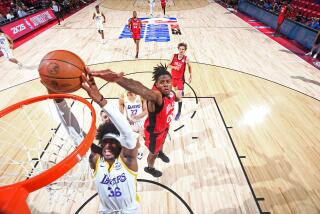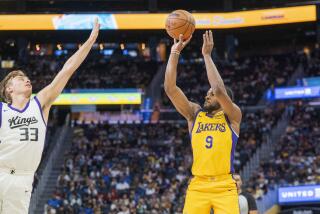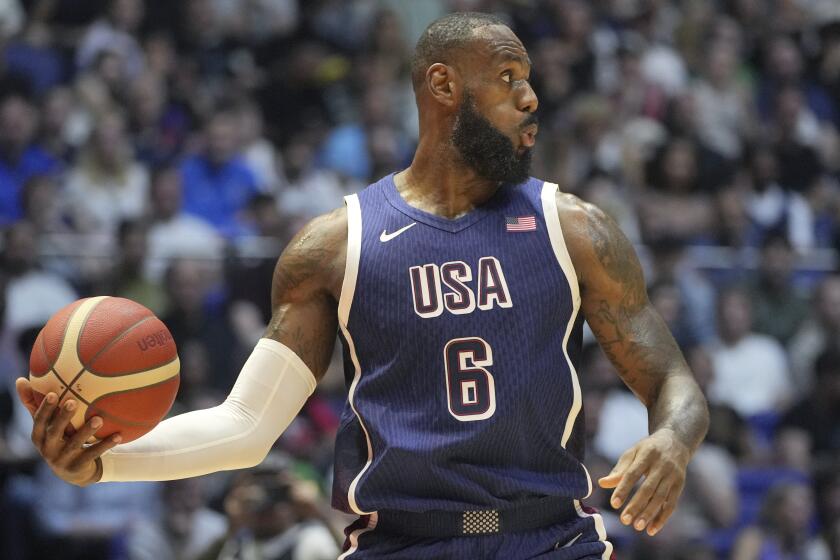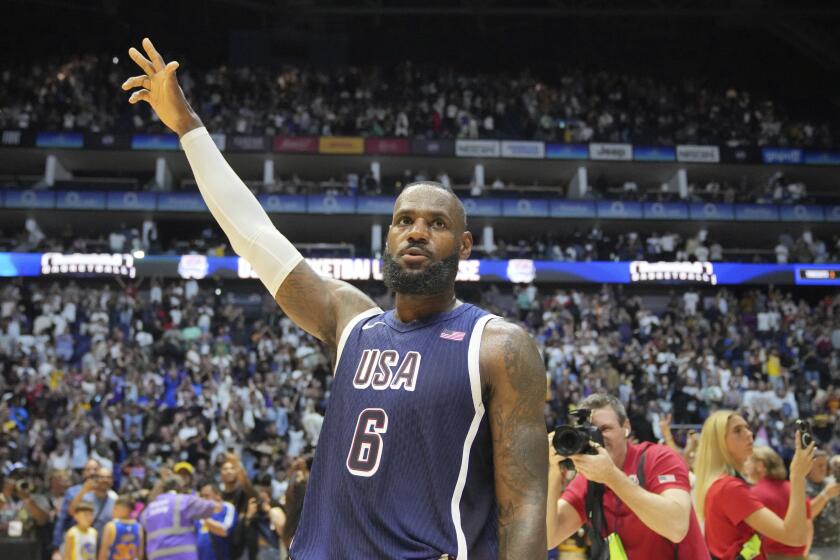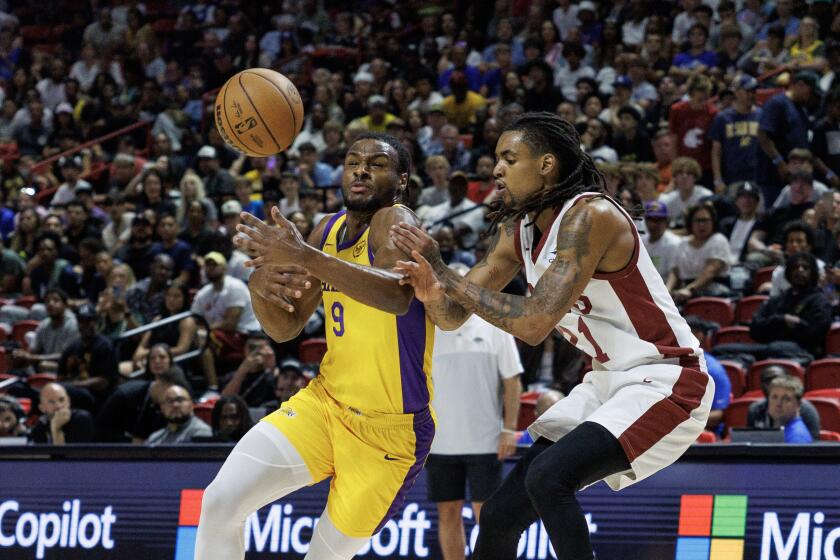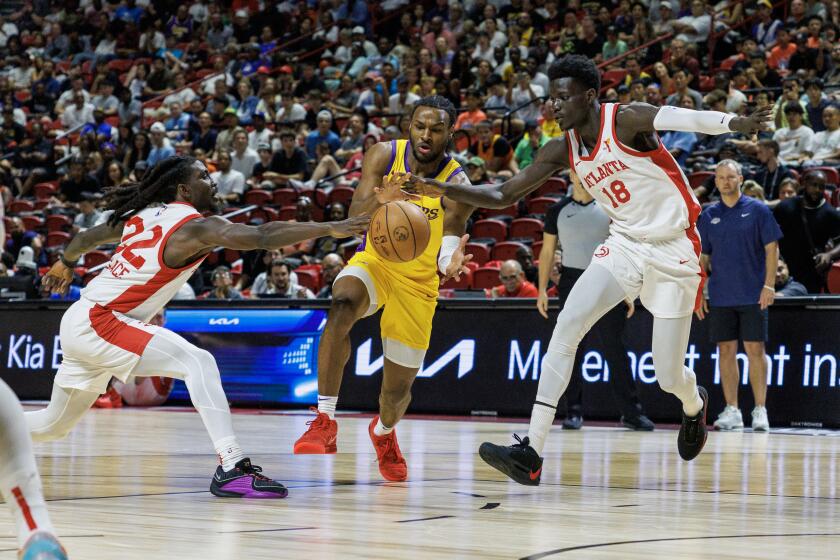Lighten Up
Who knew he still had a waist?
The Shaquille O’Neal who left the Lakers looked like a Sequoia, but this is a different Shaq, remodeled, reinvigorated and, despite what he says, really mad.
His scary upper body now tapers to an actual belt line. He says he weighs 335 but looks 20 pounds lighter than the 335 he used to say he was. His weight with the Lakers was always a closely guarded secret, but if he didn’t get to 375, he didn’t miss by much.
At 32, he looks quicker and lighter on his feet than he has in years. He might never be the force he once was but one thing is sure: You’ll never see a better Shaq than the one in the Miami Heat’s red, black and white this season.
“He’s participated in everything and I love that,” says Eddie Jones, also his teammate with the Lakers.
“I think he’s motivated. I mean, for a guy to drop all that weight over the summer, he’s got to be motivated. You don’t just wake up every morning and say, ‘You know what? I feel like losing 25 pounds.’ ”
Actually, that’s what O’Neal often tried to do with the Lakers, playing himself into shape over the season while working things out with Kobe Bryant -- usually in the headlines -- before their annual comeback in the spring.
That ended when the Lakers shocked the NBA by trading O’Neal. Owner Jerry Buss said it was just business, with Shaq fixed on an extension, that would have meant a commitment of close to $150 million, taking O’Neal through age 36 or 37.
O’Neal says he knows it was just business. Actually, he thinks that Bryant sent him away and that Buss forgot everything O’Neal did for him, and intends to make them sorry until he’s taking his grandchildren for rides on his Jet Ski.
Bryant denies playing any role, but there’s never an end to their issues. Now, however, each is on his own and if one day both may regret it, that time is not now. Kobe’s in Los Angeles, rebuilding. Shaq’s here, on an Eastern Conference power, with another glamorous city at his feet.
Miami once belonged to Dan Marino, Ricky Williams and Pudge Rodriguez, but Pudge and Ricky are gone, the Dolphins are 0-5, the Marlins are out of the playoffs, the NHL Panthers’ season is on hold, and the Big Entertainer is here.
The locals, who’ve never seen a superstar do stand-up comedy, are in awe. As Miami Herald columnist Dan Le Batard wrote after O’Neal’s media day performance:
“You’ve seen all the me-me-me that has infected sports, all the bloated ego and individualism and gotta-get-mine that tends to get in the way of smaller things, like winning....
“But there was Shaquille O’Neal, literally and figuratively the biggest superstar in all of sports, smiling again Monday afternoon [get used to that look from him around here] as he talked humbly about having no problem with subservience and knowing his place as an employee.”
That’s our Shaq, the antidote to ego in modern society.
O’Neal can actually be humble, although not for long, and he’s never subservient. Even with Jerry West there, when the Lakers did something O’Neal wanted -- like signing Dennis Rodman -- Shaq would joke that he was the GM. As for Mitch Kupchak, O’Neal seemed to think he was one of the clubhouse attendants.
O’Neal and Phil Jackson parted as allies, but they had their moments, or months, too, as when Jackson noted O’Neal’s lack of effort in the 2002 playoffs, culminated by their argument in a game at San Antonio when Brian Shaw stepped between them.
Nevertheless, if there’s some maintenance involved, O’Neal is still the NBA’s equation-changer. The Lakers are no longer the Lakers, the East is no longer puny and the Heat is back, or soon will be.
*
Riley’s Tale of Two Cities
Once upon a time, there was a forgotten journeyman player named Pat Riley, lying on the beach in Santa Monica after his forced retirement.
In 1977, he became Chick Hearn’s color commentator. In 1979, Riley came down from the booth to become an assistant coach. In 1981, he became the coach when Paul Westhead was fired. Buss tried to get West back on the sideline and West lateraled the job to Riley in front of everyone at a memorable news conference.
Riley won two titles in his first four seasons, while learning how to coach. People said he was the luckiest man alive and he didn’t disagree.
Once, Riley was entertaining friends, including Hearn and Altie Cohen, a Pacific Palisades teacher he knew from his beach days, in the Forum lounge after a game, when someone told him what a great coach he’d become.
“He said, ‘I’ll tell you something right now, I’m not saying I’m a great coach, but if I am, there are two words that can explain it. What do you think they are?’ ” says Cohen.
“My wife said ‘drive’ and ‘fairness.’ Everyone came up with some.
“And it finally came to Riles and he said, ‘Magic’ and ‘Johnson.’
“And Chick said, ‘Amen, Riles!’ ”
Riley’s elegance made him a star, but he got scant credit for the four titles the Lakers won under him. Nevertheless, he booted them to the titles in 1987 and 1988 that made it their decade. Johnson called him the difference between the Lakers, who wound up with five titles in the ‘80s and Celtics, who won three and finished the decade under laid-back K.C. Jones.
Riley coached 12 seasons with the Lakers and Knicks before he finished anywhere but first in his division. By then he was the profession’s superstar, as well as the one who’d led coaches to the promised land of million-dollar salaries.
Heat owner Micky Arison lured him to Miami by making him the game’s highest paid coach, as well as team president, with an unprecedented equity stake. When Riley finishes this, his 10th season, he’ll have 20% ... and will have earned it.
Riley’s luck turned with a vengeance. In 2000, with Michael Jordan leaving the NBA and the Heat ready to rule the East, Riley lost Alonzo Mourning, who learned he had a potentially life-threatening kidney disease.
Remarkably, the Heat went 50-32, with Mourning returning for the last 13 games.
In 2001-02, Mourning played 75 games but was below his career averages at 16 points and 8.4 rebounds and, worse, Riley and company never knew what he could give them. Miami went 36-46 and Riley missed the playoffs for the first time in his 20-year career.
In 2002-03, with Mourning gone again, the Heat fell to 25-57. Riley, a stoic who’d always hidden his pain, said he had been humbled by the game.
“Payback time,” the new, relaxed Riley says now, laughing. “I thought about that so much.... That was the basketball gods paying me back.
“When Zo came down sick, I just knew we were on our way to having to rebuild. When he finally said he couldn’t play [in 2002], I said, ‘The hell with it, let’s start rebuilding.’
“I had always thought, no matter who we had, we had a chance to win a championship. Those last two years, even though I said it, I knew deep down in my heart it wasn’t going to happen.
“We took a hit. We lost a lot of money, but we finally got it back to where there was a sense of hope. But I had pretty much had it by then.”
By the start of the 2003-04 season, the franchise was flat on its back. Crowds had been dwindling in American Airlines Arena, which opened in 1999. Heat officials worried privately that they’d spent all that money building in the wrong place.
Instead of following the money to the suburbs of Broward County, as had the Dolphins and Panthers, the Heat stayed downtown, next to the port of Miami, where Arison’s cruise ships docked. The area remained run-down as the recession set back the city’s plans for massive redevelopment.
Jones and Brian Grant, good players who’d been given superstar salaries to support Mourning, were shopped annually with no takers.
“It just wasn’t going good,” Jones said. “We picked up some good players before Dwyane [Wade] got here with Caron [Butler] and Rasual [Butler], but we just needed something bigger. We could just never get any big, big players here.”
Riley, who used to divide the season into two states of consciousness, “winning and misery,” was down to one, with no hope of the other. He made Stan Van Gundy the league’s only “assistant head coach,” preparing for the transition, but dreaded it. For a year, Riley says, he went to bed thinking about getting out and awoke wondering if this was the day.
Finally, last fall, four days before the start of the season, Riley startled everyone by resigning.
With Wade and Lamar Odom, Van Gundy overcame a 5-15 start, finished 42-40 and got back to the playoffs. However, they still had no size -- Odom was their biggest starter at 6-10 -- or cap room.
But, as Riley learned the hard way, the sun doesn’t shine on the same dog’s back every day. The basketball gods had one last gift for him.
*
Oh, By the Way, You Want Shaq?
First, Riley had to figure out if he wanted to coach the Lakers again.
Last spring, with the Lakers deconstructing and Jackson gone, Buss thought first of Riley, his old favorite. Riley flew to Los Angeles, where he still has a home. He and Buss went to dinner but soon figured out it wouldn’t happen.
However, in the course of the evening, Buss asked Riley if he’d have any interest in O’Neal.
It wasn’t a mirage. Few teams were interested in busting up their roster to make a $120-million commitment to a 32-year-old player. Of those, O’Neal would only go to certain ones, which eliminated the Indiana Pacers, who were willing to offer Jermaine O’Neal.
When the bids were in -- there were only a few, counting Dallas owner Mark Cuban’s lowball offer -- the Heat was offering the best package. Even if it didn’t add up to O’Neal’s value, the Lakers, committed to going in a new direction, said yes.
“When I first heard about it, no,” Van Gundy says. “You never think that in the end, someone will make the final decision to get rid of a Shaquille O’Neal.”
But that’s O’Neal in the flesh, bounding around the Heat’s practice court, more animated than the Lakers ever saw him in training camp.
“I think it’s going to free me up,” says Jones. “May even let me play 10 more years.
“I don’t have to be always on the move all the time. The few years I’ve been here, everything has always been movement, trying to get to the rim, fighting double teams.
“Now you’re sitting back on the perimeter, you throw it inside, you cut a little bit, a little give-and-go. Or you sit around and wait for those guys to double him and he kicks it out to me.”
Of course, Van Gundy wants O’Neal to learn a lot of new tricks, such as rotating on defense, and blitzing the pick-and-roll, which means jumping out to double-team the dribbler. Shaq says he’s “down for whatever.”
“Is he going to be as good blitzing and rotating and things like that?” Van Gundy says. “I don’t know. But do we expect him to do those things? Yes.”
First, they’ll have to show him what a pick-and-roll looks like. He rarely got close to one as a Laker, or at least not before April.
Nevertheless, O’Neal says, “I’m always ready for a change. I’m Irish. I’m a leprechaun....
“Pat told me he wanted me slim, so what I did this summer, I just laid off the weights. No weights this summer. My other summers have been weight, weight, weight. Because I take a beating. I’m the NBA’s best NFL player, so I wanted to get real big and solid so I could take those beatings, and muscle weighs more than fat.
“Of course, when you get a guy like me with a high number, you automatically equate it to fat. I’ve always been the sexiest 7-footer in the NBA. For 12 years running. But this summer, no weights, all cardio. Got that down to 335 and hopefully by the end of training camp, be 325, 330.”
Actually, it was often more like wait, wait, wait. Worse, he was more into lifting than running. The problem was, he was already strong enough and too heavy. He lost his old explosion and lacked stamina. In the playoffs last spring, he averaged 25.8 points on two or more days’ rest, 18.5 points on one.
O’Neal says he suffered “freak injuries” (and he’s currently being cautious with a tight hamstring, causing him to sit out an exhibition game Friday) but, as Heat fans will learn, he is best taken figuratively rather than literally.
If he’s talking, that’s good.
If he’s talking loud enough to be heard, that’s better. The Laker writers often had to point their tape recorders into the crowd around him and wait until they played them back in the pressroom to find out what he’d said. The Times’ Tim Brown called it “Shaq surprise.”
If O’Neal is talking so you can hear him and making jokes too, it doesn’t get any better than that.
There’s a construction boom here downtown now. O’Neal just bought Rony Seikaly’s $19.8-million house on Star Island, the celebrity enclave (Oprah Winfrey, Ja Rule) between the city and South Beach just minutes from the arena. His new Love Shaq. It’s a little old place where he can get together.
More to Read
All things Lakers, all the time.
Get all the Lakers news you need in Dan Woike's weekly newsletter.
You may occasionally receive promotional content from the Los Angeles Times.
